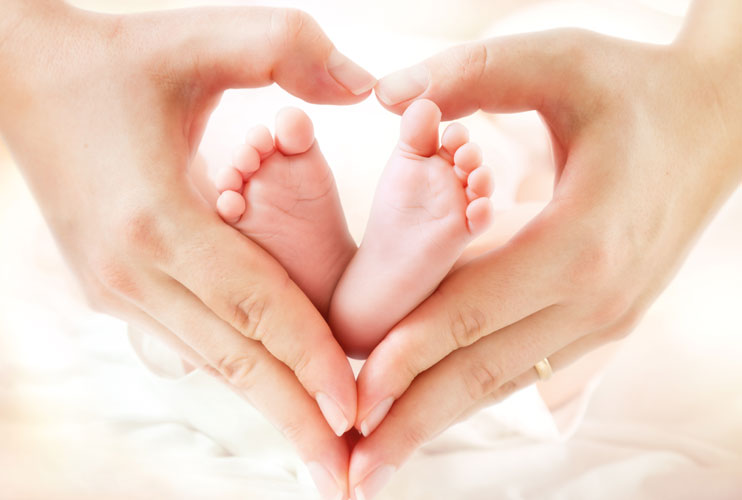Nutritional therapy is one of many steps you can take to nourish and support your family during the post natal months and is particularly important if you have a caesarean section or C-section delivery.
After childbirth and recovery from caesarean section
The time following the birth of a child is sometimes referred to as the fourth trimester as a way of describing the significance of the postpartum months. There are several major focusses for general nutritional support at this time due to the monumental changes that are happening on a physical level as well as emotionally and psychologically – for the mother, the child, the partner, the family.
If you are recovering from caesarean section, additional support for the major abdominal surgery is a consideration as well as ensuring the baby’s microbiome is given the very best chance at a healthy population of gut flora. In 2016, around 26% of births in the UK were by C-section so by understanding some of the health implications we are better prepared to support ourselves and our children in the best way possible.
Make a cosy space for mother and child which mimics pregnancy
The fourth trimester is a transitional time with the mother’s body being almost a new external placenta for the baby. The baby has moved from the inside of the mother’s body where for 40 weeks or thereabouts she or he has listened to the sounds of the mother’s body and bathed in warm fluid darkness. Although the developing infant is now on the outside of the body there is pleasure to be found in finding comfortable spaces which reflect the pregnancy; pillows, cushions, blankets, soft warm light and white noise or meditation sounds are well worth indulging in.
Make time for skin to skin, stroking and instinctual touch
Human touch is a valuable nutrient with physiological benefits that may include reducing stress hormones, producing hormones of belonging and lowering blood pressure. Holding baby skin to skin provides welcome and comfort and sustains regulation of breathing, temperature and digestive function as well as colonising with the mother’s healthy bacteria.
This first touch of mother and baby can then include the partner and begin by mother-infant bonding then progressing to include include parent infant bonding.
Care and rest, creating a safe environment
There are crucial roles here for supportive partners and the safety of the environment can make a huge difference to the post natal period.
This is a time when new mothers may be experiencing temporary hair loss or hot flushes, not too mention bleeding, pain, difficulty moving and painful sex. Hormone changes that happen during breast feeding may result in vaginal dryness so a natural lubricant and gentle touch is important.
Husbands and partners can help by supporting and providing a safe sexual environment. Full time help for cooking and cleaning for two months after birth is optimal (though not always easy!) New mums need time to rest, breast feed, recover, and nap during the day.
Postpartum depression
According to NHS UK, more than 10% of women experience post natal depression and partners may also be at risk. Nutrition experts now believe that the risk may be reduced by consuming sufficient quantities of omega-3 fatty acids and blood sugar balancing. Low blood sugar may make depression worse and it’s very easy to slip into bad habits, particularly as cravings for carbohydrates are so common at during the post natal period.
Complex carbohydrates will provide support for a healthy sugar metabolism, releasing sugar at a slower rate than refined carbohydrates. This type of eating also staves off sugar spikes and dips which is where the problems start to happen. Work with a nutritional therapist to ensure your diet is providing the best support for you and eat plenty of healthy protein combined with the best complex carbohydrates.
Your nutritionist will also be able to advise you on the best supplements for your personal and individual needs. For example, they may recommend a good multi vitamin and mineral to support the manufacture of neurochemicals involved in mood balance; serotonin, dopamine, endorphins.
If you do have a C-section delivery you may need additional nutritional and emotional support. Depression may be made worse by any feelings of failure or loss of hoped for experience. Women who have caesarean section births may be at increased risk of physical and emotional pain, trauma and even a kind of PTSD. Positive stress management techniques are particularly important at this time.
Whether the birth is natural or by C-section, feelings of loss or grief may be heightened depending on relationships with your own mother and father.
Your baby’s microbiome and C-section microbiota
When your baby is born by a vaginal delivery the microbiota is acquired from the vaginal canal, the rectal microflora and the skin of the mother. This is part of a natural process which is vital to the health of the newborn.
During C-section, the microbiome of the newborn baby may be acquired from the skin of the hospital staff and the flora present in the hospital which tend to be different strains of bacteria.
Current research indicates that children born by C-section may be at increased risk of developing gastroenteritis and enterocolitis[i], allergy and atopy[ii], obesity and weight gain[iii]. One possible way of inoculating the infant is by taking a vaginal swab and transferring the microbiota from mother to child which appears to assist with the population of the baby’s microbiome. If this process isn’t or wasn’t available to you there are plenty of things we can do in the first years of your baby’s life which will support the population of a healthy microbiome. The first two to three years are critical as the child’s intestinal microbiota establishes itself during this time.
Breast feeding and supporting baby’s microbiome
Breast milk carries microflora to the infant[iv] so the healthier the mother’s microbiota the more likely it is that the child will benefit. The health of the mother’s microbiome is key so that’s something we will look at from even before conception during the preparation months. This is an important part of nutritional support through pregnancy and the breast-feeding time which is one of the ways we can support the health of the newborn infant. If breastfeeding isn’t available to you there are prebiotic and probiotics which may be of benefit[v]. Current research indicates that both prebiotic and probiotic supplementation is the best way forward for formula fed babies[vi].
Breast feeding offers additional benefits:
- Breast feeding also stimulates baby’s microflora via the prebiotic oligosaccharides it contains.
- Breast colostrum (first milk) contains antibodies to help protect your baby from germs. The suckling of the child produces hormones that help your uterus to contract after childbirth.
- Establishing eye contact. 12 inches, the distance to your nursing infant.
Support, support, support
Whatever your birth experience, understanding for yourself and your partner is vital at this time. Additional supportive groups and complementary therapies for mum and baby are also recommended.
Here at Wildfare we suggest seeking support from your GP. They will very often provide blood tests if you request them, particularly a vitamin D test, iron, B12 and folate. Ask for copies of your test results to share with your nutritional therapist who can advise you on the best way to optimise your nutrient levels.
If you are reading this prior to the birth ensure you ask questions and find a good midwife to guide you through the process.
For further information on working with Eli Sarre or booking a consultation please contact us
References
[i] AlFaleh et al Cochrane Database of Systematic Reviews 2011
[ii] Pistiner et al, J Allergy Clin Immunol 2008
[iii] Kalliomaki et al 2008, Collado et al 2008
[iv] Fernandez et al Pharmacol Res 2013; Thum et al J Nutr 2012
[v] Rinne et al FEMS Immunol Med Microbiol 2005
[vi] Maldonado et al J Pediatr Gastroenterol Nutr 2012

